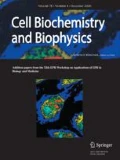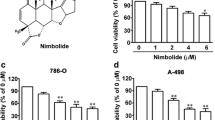Abstract
Curcumin possesses anti-cancer effects. In the current study, we tested the effect of curcumin on cell proliferation, viability, apoptosis, cell cycle phases, and activation of the PI3K/Akt pathway in the renal cell carcinoma (RCC) cell line RCC-949. We observed that cell proliferation and viability were markedly inhibited by curcumin, while cell apoptosis was promoted. The latter effect was associated with increased expression of Bcl-2 and diminished expression of Bax (both: mRNA and protein). The cells treated with curcumin increasingly went into cell cycle arrest, which was likely mediated by diminished expression of cyclin B1, as seen in curcumin-treated cells. In addition, curcumin decreased activation of the PI3K/AKT signaling pathway. In conclusion, our results demonstrate that curcumin exerts anti-cancer effects by negative modulation of the PI3K/AKT signaling pathway and may represent a promising new drug to treat RCC.






Similar content being viewed by others
References
Kraushaar, G., & Wiebe, S. (2005). Renal cell carcinoma as a second malignant neoplasm in a patient with non-syndromic hemihypertrophy and previous Wilms tumor. Pediatric Radiology, 35, 1208–1211.
Kuhara, H., Wakabayashi, T., Kishimoto, H., Sadoh, S., Suzuki, T., & Senda, Y. (1984). Malignant mediastinal myxoid tumor and renal cell carcinoma. Acta Patholoy Japan, 34, 881–887.
Ustaalioglu Oven, B. B., Bilici, A., Seker, M., Salepci, T., Keser, S., & Gumus, M. (2009). Renal cell carcinoma with pulmonary metastasis misdiagnosed as other primary malignant tumor. Journal of BUON, 14, 727–728.
Haddad, A. Q., Wood, C. G., Abel, E. J., Krabbe, L. M., Darwish, O. M., Thompson, R. H., et al. (2014). Oncologic outcomes following surgical resection of renal cell carcinoma with inferior vena caval thrombus extending above the hepatic veins: A contemporary multicenter cohort. Journal of Urology, 192, 1050–1056.
Kim, H. L., Seligson, D., Liu, X., Janzen, N., Bui, M. H., Yu, H., et al. (2005). Using tumor markers to predict the survival of patients with metastatic renal cell carcinoma. Journal of Urology, 173, 1496–1501.
Dornbusch, J., Zacharis, A., Meinhardt, M., Erdmann, K., Wolff, I., Froehner, M., et al. (2013). Analyses of potential predictive markers and survival data for a response to sunitinib in patients with metastatic renal cell carcinoma. PLoS ONE, 8, e76386.
Figlin, R. A. (2013). From the guest editor: Renal cell carcinoma: The next decade of development. Cancer Journal, 2013(19), 297–298.
White, M. C., Peipins, L. A., Watson, M., Trivers, K. F., Holman, D. M., & Rodriguez, J. L. (2013). Cancer prevention for the next generation. Journal of Adolescent Health, 52, S1–S7.
Yue, C. H., Zheng, L. T., Guo, Q. M., & Li, K. P. (2014). Study on extracting and separating curcuminoids from Curcuma longa rhizome using ultrasound strengthen by micro emulsion. Zhong Yao Cai, 37, 880–883. (in Chinese).
Lyn, L. Y., Sze, H. W., & Rajendran, A. (2011). Crystal modifications and dissolution rate of piroxicam. Acta Pharmaceutica, 61, 391–402.
Troselj, K. G., & Kujundzic, R. N. (2014). Curcumin in combined cancer therapy. Current Pharmaceutical Design, 2014(20), 6682–6696.
Sharma, R. A., Gescher, A. J., & Steward, W. P. (2005). Curcumin: The story so far. European Journal of Cancer, 41, 1955–1968.
Siddiqui, A., Cui, X., Wu, R., & Dong, W. (2006). The anti-inflammatory effect of curcumin in an experimental model of sepsis is mediated by up-regulation of peroxisome proliferator-activated receptor-gamma. Critical Care Medicine, 34, 1874–1882.
Wang, P., & Wang, B. (2014). Increased chemopreventive effect by combining arctigenin, green tea polyphenol and curcumin in prostate and breast cancer cells. RSC Advances, 4, 35242–35250.
Panzhinskiy, E., & Hua, Y. (2014). Novel curcumin derivative CNB-001 mitigates obesity-associated insulin resistance. Journal of Pharmacology and Experimental Therapeutics, 349, 248–257.
Uehara, Y., Inoue, M., & Fukuda, K. (2014). Inhibition of β-catenin and STAT3 with a curcumin analog suppresses gastric carcinogenesis in vivo. Gastric Cancer, 219, 950–957.
Killian, P. H., Kronski, E., & Michalik, K. M. (2012). Curcumin inhibits prostate cancer metastasis in vivo by targeting the inflammatory cytokines CXCL1 and -2. Carcinogenesis, 33, 2507–2519.
Chen, Q. Y., Zheng, Y., & Jiao, D. M. (2014). Curcumin inhibits lung cancer cell migration and invasion through Rac1-dependent signaling pathway. Journal of Nutritional Biochemistry, 25, 177–185.
Yin, Z., & Sun, J. (2014). Curcumin induces human SKOV3 cell apoptosis via the activation of Rho-kinase. European Journal of Gynaecological Oncology, 35, 433–437.
Buss, S., & Dobra, J. (2013). Visible light is a better co-inducer of apoptosis for curcumin-treated human melanoma cells than UVA. PLoS ONE, 8, e79748.
Son, Y. O., & Pratheeshkumar, P. (2013). Reactive oxygen species mediate Cr(VI)-induced carcinogenesis through PI3K/AKT-dependent activation of GSK-3β/β-catenin signaling. Toxicology and Applied Pharmacology, 2013(271), 239–248.
Liu, Z. L., & Mao, J. H. (2013). Inhibition of fatty acid synthase suppresses osteosarcoma cell invasion and migration via downregulation of the PI3K/Akt signaling pathway in vitro. Molecular Medicine Reports, 2013(7), 608–612.
Tsukamoto, T., & Hama, S. (2013). Selenate induces epithelial-mesenchymal transition in a colorectal carcinoma cell line by AKT activation. Experimental Cell Research, 319, 1913–1921.
Paplomata, E., & O’Regan, R. (2014). The PI3K/AKT/mTOR pathway in breast cancer: Targets, trials and biomarkers. Therapeutic Advances in Medical Oncology, 6, 154–166.
Author information
Authors and Affiliations
Corresponding author
Rights and permissions
About this article
Cite this article
Zhang, H., Xu, W., Li, B. et al. Curcumin Promotes Cell Cycle Arrest and Inhibits Survival of Human Renal Cancer Cells by Negative Modulation of the PI3K/AKT Signaling Pathway. Cell Biochem Biophys 73, 681–686 (2015). https://doi.org/10.1007/s12013-015-0694-5
Published:
Issue Date:
DOI: https://doi.org/10.1007/s12013-015-0694-5




